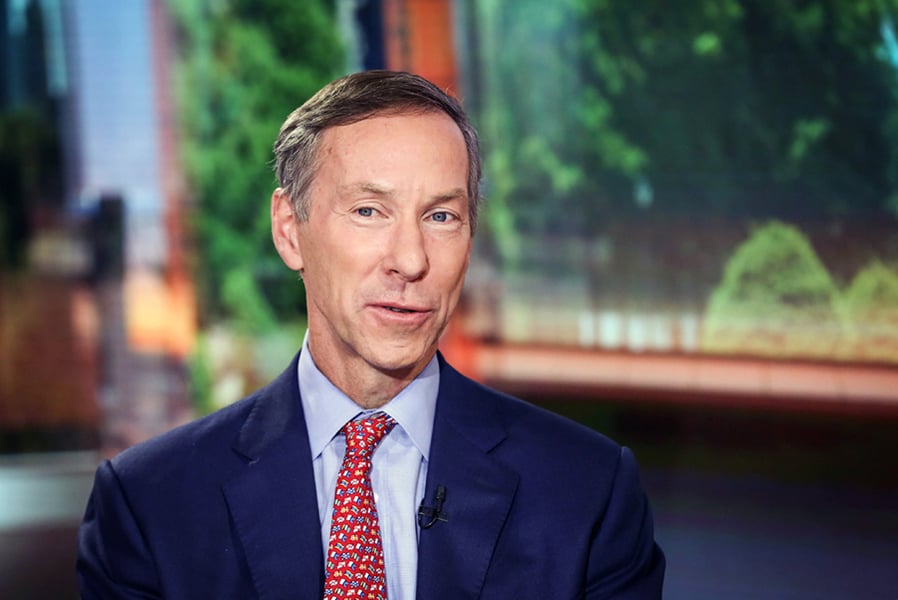With $3.9 trillion in assets under management, index fund pioneer Vanguard Group is an influential shareholder, able to weigh in on how executives across corporate America should be paid.
At the same time, because of its unique corporate structure,
Vanguard itself has legions of indirect owners — including retirement investors who have poured money into such funds as the Vanguard 500 Index and Vanguard Total Stock Market Index. The company is owned by its funds, which in turn are owned by their investors. Yet Vanguard has been able to keep its own management's pay private, including that of CEO Bill McNabb.
In early 2015, Mr. McNabb penned letters to boards at Vanguard's 500 biggest holdings — the company owns about 5% of every publicly traded U.S. business — explaining his thoughts on governance and encouraging them to pay “sensible compensation tied to performance.” While the Valley Forge, Pa.-based money manager votes to approve the vast majority of executive pay programs, it has hundreds of discussions with members of boards each year about executive compensation and governance.
“It's an interesting twist,” says David Larcker, a professor at the Stanford Graduate School of Business who studies governance and executive pay. “They've begun actively challenging companies more.” But Vanguard's lack of transparency on pay, he adds, makes it hard for outsiders to judge if it has its “own house in order.”
Mr. McNabb received $10 million to $15 million in compensation for 2015, according to people familiar with the matter. That's not out of line with the pay enjoyed by the chiefs of two big competitors with large index fund product lines. New York-based BlackRock, which runs the popular iShares exchange-traded index funds and is the only money manager bigger than Vanguard, with $5.1 trillion in assets, paid CEO Laurence Fink $25.8 million in 2015. Joseph Hooley of State Street, with $2.3 trillion in assets, received $11.3 million.
The pay packages of those two executives are known because they work for publicly traded companies. Vanguard isn't public but “client-owned,” according to its website. The company says this structure helps it drive fund expenses lower — it charged an average 0.18% of assets per year in 2015, far below the industry norm, and some of its biggest funds cost just 0.05%. Other asset managers face the conflict between customers wanting the lowest possible costs and owners requiring a profit. At Vanguard, those two parties are one and the same, so when the company becomes more cost-efficient, it returns that gain in the form of lower fees.
Vanguard hasn't reported figures on pay to senior officers since the 1990s. Mr. McNabb has argued that keeping the company's compensation under wraps is good for it and its fund investors. “It is actually, from my perspective, a competitive advantage not to be laying it all out there,” he said on Oct. 18 on Bloomberg TV. “Keeping that part of the equation private — between us and the individual — it's been a really good thing in terms of hiring and attracting talent.”
Vanguard spokeswoman Arianna Stefanoni Sherlock said in an e-mail that “we believe that determining the specific structure and pay is a decision best left to the companies' boards.” Likewise, she wrote, the independent board of directors of the Vanguard funds set pay for the company's senior officers with “Vanguard shareholders' best interest in mind.” She declined to comment further.
(More: Jack Bogle looks back on the 40th anniversary of the index fund )
Holding down compensation for executives such as Mr. McNabb and other employees would be one way to reduce fund shareholders' costs, but those investors also have an interest in performance. Vanguard has to compete for talent in the richly paid financial-services industry.
About two-thirds of its assets are in index funds and ETFs, which passively track market benchmarks instead of trying to pick individual stocks and bonds. Such funds are less expensive to run, but not as autopilot as they may sound. “Managing index funds involves a very specialized skill set and a good degree of experience, because markets are living, breathing creatures,” says Ben Johnson, director of global ETF research at Morningstar.
A key element of Vanguard's executive pay is a deferred compensation program, set up by founder John Bogle in 1983. It pays out an annual dividend on partnership units — a kind of phantom stock — that's based on business results, relative fund performance, and cost efficiency.
Mr. McNabb has worked for Vanguard for 31 years and was named CEO in 2008, two weeks before the collapse of Lehman Brothers. Since that year, Vanguard's assets have grown by $2.8 trillion, driven in part by a dramatic shift of investor dollars into index funds and other low-cost products. In 2016 the company's funds attracted a record $305 billion in net inflows. During McNabb's tenure, the average cost of Vanguard's funds has been shaved down further, from an already low 0.2% of assets per year, according to figures from the company.







